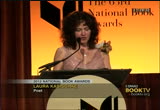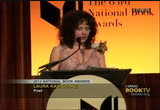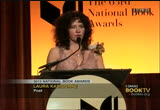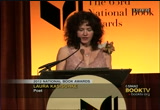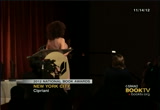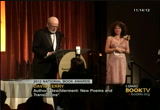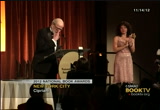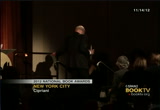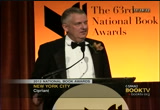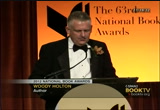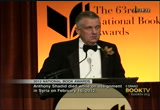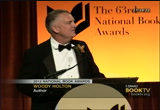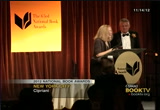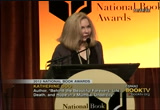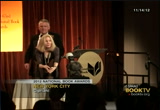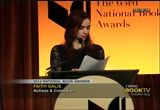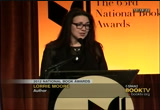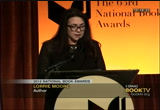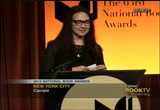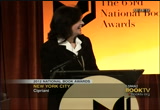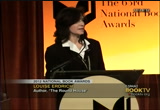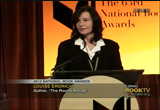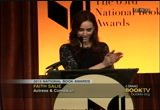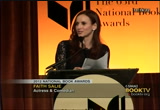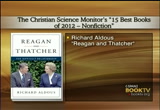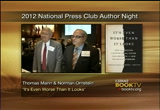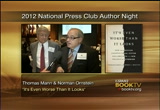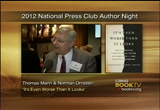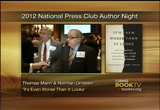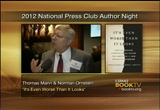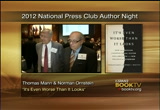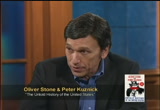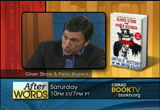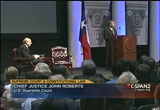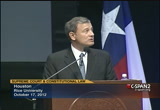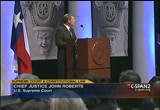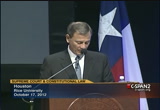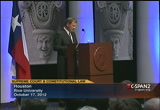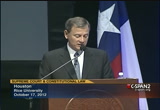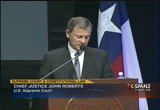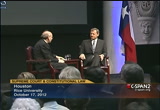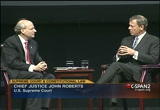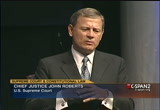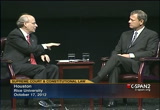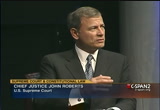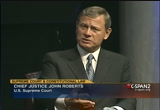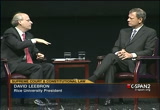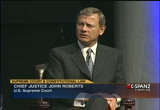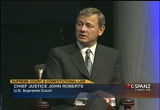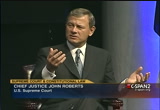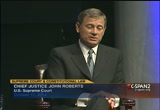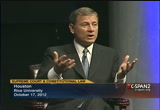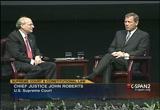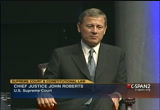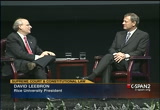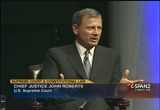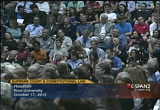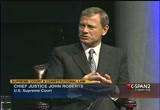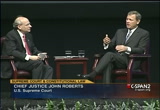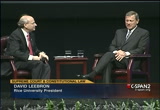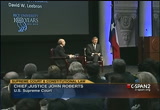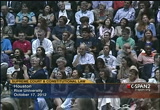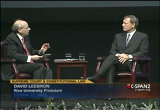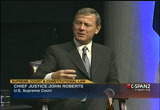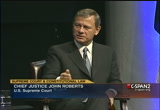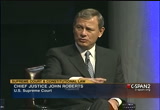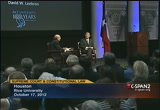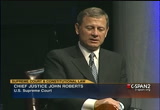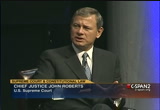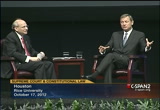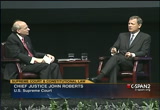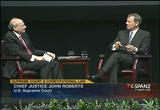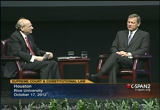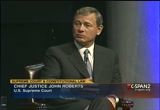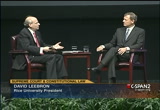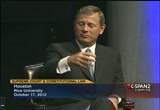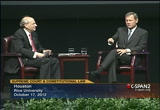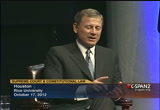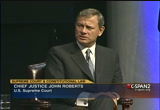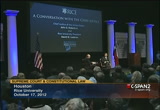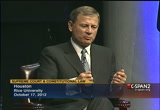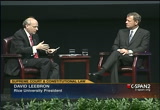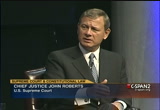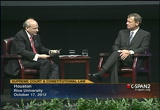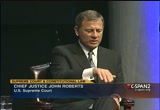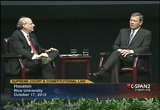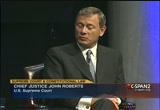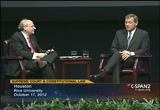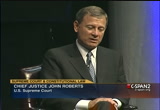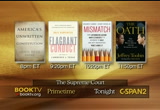tv Today in Washington CSPAN December 26, 2012 7:30am-9:00am EST
7:30 am
and disagree with them. the second was that all judging is political, personal, that no judge can be impartial. all that baggage i simply bring with us. this point stop me at some conference. that conference. outpointed and. the poetry world is a small one, a subculture of subculture. how are we to read the work of our peers, some of whom we shared bathrooms and cubicles and sandwiches with. to read thousands and thousands of lines of poetry over the course of the summer is as it turns out to drink from the leaf. ..
7:31 am
>> that i am one person, that i will live and die alone, that i will only ever inhabit this one consciousness. i was wrong about this too. to read this poem was to be in conversation with a level deeper than who we are, where we are and what our homely words and thoughts and deeds and lives don't mean. still, enduring merit, until this summer did i even believe in it? did i simply believe enduring merit could never be agreed upon, that all things are relative and, therefore, can not be said to have merit and their endurance cannot be predicted? if so, i no longer believe it or even remember believing it. these five radioactive books glowed green and dustless among the others. if they are not still read in 100 years, it will mean the cockroaches only survived
7:32 am
whatever happened to vegas. there is always more mystery in a closed box than in an opened box. nope. when it comes to a box full of poetry, that is not true. over the summer those boxes turned into a room full of books full of poetry, full of mystery. living at the center of that mystery and indulging one's self in the central and intellectual pleasures of poetry for months, if there's anything better on this planet than the impulse to poetry, i have no idea what it could b be, and i feel so grateful to have been born to have seen that really. above all, there's poetry. it's speaking for all of us when it utters. unable to know is a condition i've lived in all my life, a poverty of imagination about the life of another human being which you may know are lines from the book our panel
7:33 am
7:34 am
>> thank you so much. when i, when i heard that -- when harold called me and said i was a finalist, i went out to, i took my daughter elizabeth out to lunch with me at murphy's pub, and we talked about how nice that was. and i said, well, the only thing i had is this amazing rivals that i suddenly have and i admire so much that my only
7:35 am
advantage was that i was so much older than anybody. [laughter] so babe they would, the judges would decide to give me a preposthumous award. [laughter] and so i think they have. but i'd like to say how grateful i am, and i especially thank randy -- [inaudible] [applause] who have been wonderful to me for years k and randy and -- and
7:36 am
randy and shannon barker and natalie smith who designed the book, marvelous photograph on the cover is by my son, photographer steven ferry. and i'm crazy, but thank you. [applause] [inaudible conversations] >> the national book award for nonfiction will be presented by woodty holten. woody holten is a professor at the university of south
7:37 am
carolina. his 2009 "abigail adams" won the bancroft prize. holten is a finalist for the george washington book prize and national book award. his first book, "forced founders: indians, debtors, slaves and the making of the american revolution in virginia," won the organization of american historians 'mel kurdy award. i'm honor today introduce -- honored to introduce woody holten. [applause] >> first, i want to celebrate the wisdom ask and the congeniality of the fellow judges who gave up a half year of tear own writing to -- of their own writing to help find
7:38 am
the fife amazing books that we present to you tonight. they are brad gooch, linda gordon, susan orlene and judith -- [inaudible] [applause] the other judges and i also want to give special thanks to sherry young who was our tireless and perfectionist liaison at the national book foundation. thank you, sherry. [applause] the finalists for the 2012 national book award for nonfiction are anne applebaum, "iron curtain: the crushing of eastern europe, 1845-1856" published by doubleday.
7:39 am
and katherine boo, behind the beautiful forevers. [applause] life, death and hope in a mumbai undercity, published by random house. and robert a. caro, the passage of power, the years of lyndon johnson, volume 4, published by alfred a.k november, and domingo martinez, the boy kings of texas, published by alliance press. and finally, the late anthony shadid, house of stone: a memoir of home, family and a lost middle east published by haughton mifflin harcourt. [applause] the winner of the 2012 national book award for nonfiction describes a world that couldn't be any more different from the world that we're enjoying here tonight.
7:40 am
and yet it's a world with that our world depends entirely upon. the subject of this book have been patron hissized -- patronized and romanticized and eagerly ignored in previous work. in this book they appear in all of their complexity. the villains and the sometimes villains along with the sometimes heroes. the earth nothing mying behind this book reminds us all that good listening is an ethical act. stylistically, this book pretty much invents a new genre of of nonfiction writing pause the author -- because the author rivals the great novelists in developing characters and
7:41 am
plotting the various narratives that intersect and setting up surprises and creating tension. the winner of the 2012 nonfiction national book award is katherine boo for "behind the beautiful forever: life, death and hope in a mumbai -- [cheers and applause] ♪ ♪ >> um, i find myself like mitt romney the other night without a speech. [laughter] so i just, i want to say, first, that this, that it is such an
7:42 am
honor to have been able to be in this same room last night with the finalists who don't need me to tell them what extraordinary company they are. um, this book was done as labor of love for my husband who brought me in as a poverty writer, brought me into a world that i didn't know and made me believe that the stories there could be told. um, but the work itself was the product of some extraordinary women who believed in me in this book and gave me the time to do it, and that's binky urban and kate medina and london king and all these ferocious women at random house. and i am grateful to them. [applause] i also have to say that this book would not be possible without two other extraordinary women which are they're -- [inaudible] who are my translators on this project and who risked more than
7:43 am
i did to tell these stories. and finally i am grateful to the courage of the people who allowed their stories to be told. and if this prize, um, means anything, i think it's this: it's that small stories in so-called hidden places matter. and one of the reasons that they matter, i think, is because, because they implicate and they complicate what we generally consider to be the larger story in this country which is, you know, and throughout the world which is the story of people who do have political and economic power. and, um, i'd just like to remember anthony shadid who was one of those great believers in small stories, and we miss him badly and thank you. [applause]
7:44 am
>> i love that when writers are at a loss of words, they are still eloquent. to present the 2012 national book award for fiction is lori moore. lori moore is the author of three story collections and three novels, the most recent being "a gate at the stairs," a finalist for the orange prize. her fiction and nonfiction have appeared in the new yorker, "the new york times," the paris review, the yale review and elsewhere. she has been the recipient of the irish times' prize for international fiction, the rea award for the short story, the o'henry award and a landen fellowship. she was a member of the american academy of arts and letters, and it gives me great pleasure to introduce lori moore. [applause]
7:45 am
♪ ♪ >> the other members of this year's jury for the national book award in fiction are stacy, dinale and janet perry. [applause] why would these otherwise sane, reasonable and brilliant people consent to this chore? one where you make a thousand enemies and maybe only one friend, one where your front porch fills up with packages, and your neighbors think you have a terrible late night online shopping habit. [laughter] through the entire spring and summer.
7:46 am
one does it for the champagne, of course, even if the champagne turns out to have a lot of peach stuff in it. [laughter] but one does it, also, to be part of a celebration of the deep mind melt that is reading. how else is a human mind is so fully and exquiz italy -- exquisitely realize except through a piece of literary fiction? desire, loneliness, the hobbled search for justice and for just one thing that is lucky or fair, these are some of the timeless themes literature has explored from the beginning, and this year is no exception. the finalists are junot diaz, this is how you lose her. [cheers and applause] finish -- published by riverhead
7:47 am
books, an imprint of pepping win group -- penguin group with, usa. dave egger, a hologram for the king -- [applause] published by mcsweeny's books. louise erdrich, the round house, published by harper, an imprint of harpercollins. [applause] ben fountain, billy lynn's long -- [inaudible] [applause] published by echo press, an imprint of harpercollins. kevin powers, the yellow bird. published by little brown. [applause] the 2012 national book award for fiction dose -- goes to "the round house", by louise erdrich.
7:48 am
7:49 am
national book foundation and also the judges, and a shout out for all of the native people who are watching this live stream. [applause] i want to thank harpercollins. it's not each a huge company anymore -- can it's not even a huge company anymore. [laughter] but it's always been about four or five people to me. people who believed so strongly in my work that they've supported me and my family and literature. my bookstore and all of us who work there through these years. i want to thank my editor, terry
7:50 am
cardin, for believing in the book. [applause] jonathan burnham, jane byrne, jim duffy, i want to thank andrew wily and jim ott. [applause] i want to say to my fellow writers, you've written extraordinary books. i don't really know why i'm standing here, but i've been working at this about a hundred years. not as long as elmore re demand, but a long time. [laughter] and i wouldn't be here if it weren't for my daughters. [applause] my husband dan, my mom and dad and all of you. i'd like to, in the end, accept this in the spirit of the turtle
7:51 am
mountain chippewa people and in recognition of the grace and end diewrns of native women. this is a book about a huge case of ip justice ongoing -- injustice ongoing on reservations, and thank you for giving it a wider audience. it means so much to all of us. thank you. [applause] in and so this concludes the ceremony. please, help me congratulate all the finalists, winners and judges. [cheers and applause] everyone is invited to join the after party on the balcony. i would sincerely like to thank
7:52 am
the national book foundation and especially harold for inviting me to be a part of this evening. and one book i have predictably read a lot of lately is "good night moon." so i would like to end tonight's ceremony with this. good night eaters, good night -- good night humor and arthur schulz burger jr. good night publishers whose jobs are in flux, good night, steven king, who is wearing a tux. good night, unknowns and good night, famous, good might, elle mother leonard and martin amos. -- that's the best i could do with that one. good night, stars, good night, air, good night writers everywhere. thank you. [applause]
7:53 am
♪ ♪ >> for more information about the national book awards, visit national book.org. >> with just days left in this month and this year, many publications are putting together their year-end lists of notable books. booktv will feature several of these lists focusing on nonfiction selections. these titles were included in the christian science monitor's 15 best books of 2012 nonfiction. in "reagan and thatcher: the difficult relationship," richard aldous, literary professor at bard college, argues that the relationship between former president ronald reagan and former british prime minister margaret thatcher was more tumultuous than they let the public believe. author renya grande in "the
7:54 am
distance between us: a memoir." in "embers of war: the fall of an empire and the making of america's vietnam," frederick logevall. and seth rosenfeld in "subversives," for an extended list of links to various publications 2012 notable book selections, visit booktv's web site, booktv.org, or our facebook page, facebook.com/booktv. >> two familiar faces to regular c-span and booktv watchers, norm ornstein and thomas mann. their most recent book, "it's even worse than it looks: how the american constitutional system collided with the new
7:55 am
politics of extremism." mr. ornstein, very quickly, what's the premise of your book? >> first, i have to say, peter, that we've been with c-span since the beginning, and i've got pictures of my office of moderating sessions on the puffth an vest ri of c-span which was a very long time ago. >> and i was on the panel. >> and he was on the panel, with a very young newt gingrich among orrs. [laughter] a very thin newt gingrich, but that's a different story. this is a book about the reality that in the 43 years that the two of us have been immersed in the politics of washington from one end of pennsylvania avenue to the other, we have never seen it this dysfunctional. the dysfunction is at a critical mass, and we felt we had to speak out about how the problem is, as the book says, even worse than it looks. it never looks good. and we have to talk about 40's at fault and -- who's at fault and what we can do to get out of it. half the book is about how we can get out of this mess.
7:56 am
>> the argument, basically, is twofold. one, we have now polarized political parties. internally, homogeneous, very much at loggerheads much like parliamentary parties, vehemently optional. but they have to work in a constitutional system that's based on separation of powers and checks and balances. the mismatch between our parties and our governing institutions is problem number one. problem number two which is the toughest thing for us to say and for many people to hear is that in the parties are not equally implicated in this. we have something called asymmetric polarization in which the republican party has in recent years become almost a radical insurgency quite
7:57 am
prepared to repeal a hundred years' worth of public policy. so we don't know how to cope with the situation when both of our parties are not operating in the pain -- in the mainstream, and the book is written to help people understand why this has happened and what we can do about it. >> now, wasn't there a time, though, that the democrats were the party that was asymmetrically out of balance with the rest of the nationsome. >> oh, yeah. that's been true many times in history, most recently in the late 1960s, you know, over vietnam and other issues. but you could go back to the 1890s which was the last period of dramatic polarization like this when the democrats were off the rails on the left. you know, we come out of these terrible problems, but it can take a decade or many for, and we don't think we have a decade or more, so there's a sense of urgency in what we wrote and a
7:58 am
bluntness, frankly, that has not been characteristic of a lot of our work, but we feel it was necessary. >> thomas mann, did the 2012 elections clarify anything? >> by all appearances, it was a status quo election, returning us to the division of power; obama in the white house, democrats in control of the senate, republicans of the house. but appearances can be deceiving, and in this case are. the most important reality of the election is that the republican effort to oppose anything and everything proposed by obama -- almost like a parliamentary party -- was not rewarded. the taking the debt ceiling hostage was not rewarded, calling the obama health care plan which was their own only a few years earlier socialism was
7:59 am
not rewarded. that was not they have to begin to rethink themselves and, importantly, democrats will not automatically embrace the same tactics in opposition. so i think that was an important change that creates a new dynamic not that's going to solve our problems. there's going to be no sitting around the campfire in washington making nice to one another. but the possibility now exists for a real effort and a successful effort to deal with our most pressing problems. >> two familiar washington faces, thomas mann and norm ornstein, "it's even worse than it looks." this is booktv on c-span2. >> you've been watching booktv, 48 hours of book programming beginning saturday morning at 8 eastern through
8:00 am
monday morning at 8 eastern. nonfiction books all weekend, every weekend right here on c-span2. >> so the soviets put the missiles in cuba. the united states discovers that with our surveillance flights over there, and then the tension biddings, -- builds, and we have a quarantine, a blockade around cuba. and one of the things that happens during that time is that a soviet submarine is found by american, by american ships, and they start to drop missile charges on the soviet submarine. they knocked out the electrical system. people were passing out inside the sub pa lean. they had no communications with the kremlin. the commander says load the torpedoes, there's attack. the world war probably started already up above, we're not
8:01 am
going to be doing somersaults down here, we're not going to disgrace our country. they set it ready to launch. fortunately, one of the other commanders on the ship who had a lower rank talked him out of it. >> what was his name? >> arkopov. he might have saved the world. >> this was really so close to the edge. it was one of the scariest moments in man kind. we didn't know this. we were teenagers, but my god, i'm just so grateful. i mean, all this criticism of kennedy and all this after quarterbacking, but, my god, we wouldn't even be here to talk. >> director oliver stone and peter kusnik on the untold history of the united states. booktv's "after words." on c-span2. >> in october chief justice john roberts had a conversation with
8:02 am
students at rice university. he talked about challenges to the constitution, the political labeling of justices and his favorite movie. this is about an hour. [applause] >> thank you very much. thank you. thank you, david, for that gracious introduction and all of you for a very, very warm welcome. this is my first visit to rice, and i'm already glad that i came. president levy has told you i can't talk about anything current, future or past -- [laughter] so my remarks will be brief. [laughter] i've had the pleasure of knowing david for 35 years. as he's mentioned, he was a president back then, too, of harvard law review.
8:03 am
so he is used to holding the reins of power. a chief justice also holds the reins of power, the only difference is that a chief justice must hold them lightly, lest he discover they're not attached to anything. [laughter] perhaps the faculty feels the same way about a university president. [laughter] nevertheless, i know from long and personal experience that david brings to rice a special vision, talent and leadership. this school is fortunate to have him at the helm, and i know he feels blessed to be there. i'm especially pleased that david invited me to visit rice as part of the centennial celebration of the university's founding. and i extend my sincere congratulations to the trustees, the faculty, students and alumni on your first great century. the founding of a new university is always an historic occasion, but the founding iserrer
8:04 am
moanny -- ceremony for rice was truly extraordinary. i went back to read the newspaper accounts from october 1912 that reported the event. the papers reported that the distinguished first president of rice, edgar odell love vet, invited 150 renowned scholars from around the world to attend the three-day founding celebration. the scholars donned full academic roads and marched to the accompaniment of a band. president love et himself prepared and orally delivered an epic essay on his vision for the new institution. that essay fills some 85 pages in print. there's no need to panic -- [laughter] or head for the exits. i do not intend to emulate president lovett in that respect. the newspapers reported that the formal invocations began on october 12th which president
8:05 am
lovett intentionally timed to coincide with the anniversary of columbus' arrival in the americas. he aimed very high in his vision for the new school. the president, though, was not the first speaker. after an opening prayer, a princeton professor -- henry van dyke -- recited a lengthy poem entitled "texas: a democratic ode," which he wrote especially for the ceremony. this poem, crawn from -- drawn from an indian legend, invoked images of frontier pioneers. the "dallas morning news" reported that the audience listened to the poet's words, quote, with the strictest attention punctuated with frequent applause. now, the next speaker, the chief justice of texas, spoke in prose. his review was nowhere near as good as the poet received. [laughter] now, in the height of that i thought the best -- in light of that i thought the best course would be for me to compose a
8:06 am
poem for this occasion. [laughter] again, there's no need to panic or run for the exits. i gave up that plan when i couldn't find suitable words that rhymed with latin legal terms like suey generous. [laughter] president lovett delivered his opus which was entitled the meaning of the new institution. his essay is, in fact, a truly magnificent, scholarly work. it presents a thoughtful and prophetic vision of what the rice institute would become. i'd like to focus on just one point that he made. he observed that a great challenge in creating any institution is, quote, to plan at one and the same time for the immediate future and for the next 100 years. we're now at the century mark, and i think it's safe to say that president lovett and the six presidents who followed him have met his challenge. rice's academic programs ranging from space science and
8:07 am
nanotechnology to the baker institute for public policy are marked by both relevance and durability. and look at the graduates: rhodes scholars, astronauts, an attorney general, a bestselling author. the diversity is truly amazing. rice has excelled in ways, though, that even lovett could not have guessed. i'm talking, of course, about rice's famous come from behind victory over heavily-favored colorado in the 1938 cotton pole. laugh. [applause] it is at least famous in the halls of the supreme court. because then, until then unbeaten colorado was led by future supreme court justice byron white. despite a tell lahr offensive and defensive performance from white, he threw a touchdown pass, scored on an interception and kicked two extra points, the owls prevailed by a final score of 28-14. not even president lovett could
8:08 am
have foreseen that. [laughter] now, when president lovett spoke 100 years ago, the newspapers around this state and around the nation took note that something big was happening in texas. "the new york times" reported that president lovett had attracted an array of learning such has seldom been assembled in the unite. the "dallas morning news" waxed almost mystically. it observed that president lovett's speech coincide with the the early evening appearance of both jupiter and venus and suggested that the evening sky was an august ri of a bright future for the institute. not every newspaper was as per sentive or tran accept cant. one local journal reported the founding of rice in the same column as the news that congo, the world's largest circus elephant, was coming to town. [laughter] but we now know 100 years later that those who bet on the future
8:09 am
greatness of rice bet right. now, as i said, i'm going to keep my remarks a great deal shorter than president lovett'sst so i'd like to just close with congratulations to president he baron, and i'm delighted to have the opportunity to call him president once again. now, any of you who have been to the supreme court know that the justice on that court are used to ask asking lawyers a lot of questions. today we're going to turn the tables a little bit, and we're going to have a lawyer ask me a lot of questions. thanks very much. [applause] >> thank you so much, mr. chief justice. i thought i'd begin, we have people from all parts of our community, but we have a lot of students here today. and among the student, of course, are quite a number who
8:10 am
are thinking about going to law school. and yet what they've been reading about is both a kind of decline in the reputation of law schools, maybe even a decline in reputation of lawyers, although that's hard to imagine. [laughter] questions about job prospects after law school. and i thought we would take this opportunity to hear your thoughts and reflections and maybe kind of advice for our students and others who are thinking about going to law school, what a career in law should be or how they should be thinking about the future of law and what the opportunities are. >> well, it's an obvious answer but one that a lot of people don't think. the first thing you have to do is ask you're why you want to go to law school. i think there are a lot of people who go to law school because they're not good at math and can't think of anything else to do.
8:11 am
[laughter] and they often turn out to be very disappointed lawyers. i suppose the better way to put the question not so much why you want to go to law school, but why do you want to be a lawyer? and you ought to do some serious soul searching about that, because it's always a difficult profession, but particularly these days. if you want to go to serve your community perhaps as a prosecutor, for example, that's a good reason. there's something very gratifying about being able to stand up in court and say that you speak for your country. same is true on the other side. maybe you feel motivated to represent the rights of those people who are accused. that's another good reason. you know, when they announce the case in court, the bailiff will say this is so and so, people v. smith. and the district attorney will stand up and say oom so and so -- i'm so and so, i speak for the people. i have a friend who's a criminal defense lawyer, and when the
8:12 am
prosecutor does that and it's his turn, he stands up and says i'm so and so, i also speak for the people, just one at a time. and perhaps you want to go to law school because you have a particular policy area that you're interested in. you want to do what you can to promote environmental protection, and you think working through the law is the best way to do that. but you have to have a reason. there are better things to do if you can't think of something to do than embark on a particular career path. >> thank you. i want to now turn to the court for a moment and spend a little bit on public perceptions. we read about the court, and we read about decision offense the court -- decision on the court. a common description is people talk about conservatives on the court and liberals on the court, and there seems to be that categorization that's set in and sometimes it's not the public perception, the media perception. is there a different way that you would like people to think
8:13 am
about b the court and the justices on the court than those categories? >> well, sure. i don't think it's a very accurate way to view the court. it's importing from the political branches categories that don't quite make sense in the nonpolitical branch. first of all, most of our work you can't identify a liberal or conservative view. we have a very difficult bankruptcy tax case, nobody could say, well, you're a liberal if you want to allow the deduction by the estate, but you're a conservative if you want to require the debtor to -- i mean, it just doesn't make any sense. and most of our work concerns cases like that. but even on ones that are a little more accessible to the public generally, it's hard to pick the category. we had a case last term that hosanna to beler or case which involved the question of whether or not certain discrimination laws should be applied to religious institutions. so you could challenge the hiring or firing of a minister, for example, on the grounds that it was discriminatory.
8:14 am
now, what's the liberal position in that? is it the view that u should extend the discrimination laws, or is it the view that you should protect the free exercise of religion to the greatest extent possible? we look at these cases and resolve them according to our best view of the law not in terms of a political or conservative agenda. now, there are ways of characterizing us that make a little bit more sense in terms of the work we do. some of my colleagues refer to it here fairly strictly to the text of the statute. others of my colleagues like to look more expansively to what we call the legislative history, the background of the statute or its purpose, and it makes sense to refer to them in those terms. some of us think it's very important be what the framers -- what the framers of the constitution were thinking about at the founding when they drafted it, others of us on the court take a more flexible view and think that the interpretation of the constitution should be informed
8:15 am
by evolutionary developments. again, those sorts of things make sense. it's just easer isier, i -- easier, i think, for reporters to say that justice is liberal, and that justice is conservative, and i don't think it's a helpful way to look at what we do. >> let me switch from there to a question about a little more internally focused in a sense b. i think you've expressed the desire to have a more unified court a court that felt more a court as a whole rather than just individual justices, a desire to have maybe fewer 5-4 decisions and fewer dissents. if we look at 5-4 decisions since the, i think since the warren court, that has shown a steady increase from about 12% to 22% whereas the number of dissents has actually remained pretty stable over that time, i think at about 18%.
8:16 am
do you think those are good metrics for the court? how would you like to see more kind of cohesion among the court, or have you come to a somewhat different view about those things? >> no. i mean, the first thing you need to do is get a good sense to have the statistics, because i think most of the cases people who follow the court in a serious way, you think about the sharply-divided 5-4 cases that get a lot of political attention. most of our cases are unanimous. this past year i think it was 44% that's gone pretty much around that same number. if you take cases that were 7-2, 8-1 or 9-0, that is two-thirds of our cases. in other words, we come to fairly broad agreement on two-thirds of the cases, and even the 5-4 ones are not always as controversial as you might think. among the 5-3 decisions we
8:17 am
had -- 5-4 decisions we had last year was one asking when you overstate the basis of a capital asset, thereby reducing the income, is your criminal prosecution summit to a three-year statute of limitations or aic-year limitations? that was a knockdown, dragout fight -- [laughter] leading to a 5-4 decision. so sometimes it doesn't have anything to do with political perception. i think the broader agreement you can get on the court the better. the man in the street is just naturally going to say, well, the court was 9-0. that's probably right. the court was 5-4, you say, well, you know, there must have been good reasons the oh way. so to the extent we can get to a broader agreement, i think it's better. and the way you get to broader agreement is of to have a narrower decision. if you say the basis for decision is going to be a fair row ground -- narrow ground, more people can agree on that.
8:18 am
if you do it more broadly so that it's going to affect more future cases, then people start saying, well, i can't go quite that far, so i'm going to write separately. now, i happen to think that's a good thing, that our decisions reach as narrowly as possible rather than the justices trying to write broadly to cover all sorts of situations they might not have anticipated or thought about carefully enough. so i said it earlier and, frankly, got a lot of criticism to say it was a quixotic adventure to say we wanted to move to more consensus on the court. i still think it's worth working toward. sometimes it can't be achieved. you know, if one justice thinks that a particular practice violates the fourth amendment and another justice thinks that it doesn't, they can't meet in the middle. they can't say, well, it kind of violates the fourth amendment. [laughter] so there are grounds, and i'm certainly not talking about anybody yielding on a matter of
8:19 am
principle. but the effort to reach agreement which i think you can achieve in more cases by trying harder at it and trying to focus on a narrow or grounded decision is a worthwhile objective. >> that kind of leads to another question. the supreme court is a very exclusive club, but it does not get to pick it own members. and we have, of course, a confirmation process. are there things now that you've been chief justice of the united states for a while that you kind of wish were a bigger factor in the selection? different questions that perhaps senators were asked or other qualities that maybe they should focus on in the confirmation hearings that they don't now focus on in confirmation hearings? >> right. although i thought the confirmation hearing worked out pretty well in the end -- [laughter] it's not a very edifying process. i mean, the formula is very well established. senators ask questions about a
8:20 am
current hot topic b that they want to lay out a position on. they know the nominee can't properly answer those questions. the nominee then says i can't answer that question. the senator scowls and asks the question again. [laughter] the nominee says i still can't answer that question. then the senator's time runs out, and another senator does the same thing. [laughter] it is, it is not useful in any way. and other than to allow the senators to convey their views on a particular issue. that's not what it was intended to do. now, it's presumptuous of me or anyone else to suggest to the senate what they should be asking about, but i think it would be more useful to ask a question that the nominee can answer. along the lines, say, of what is your view of the role of the supreme court, a court under the constitution? people have different views. and, you know, i have a view, i think it's right, but other
8:21 am
people have different views, and they're wrong. [laughter] no. my point is you can learn a lot about a m nominee -- not right or among, i mean, not that you vote against him if he adopts the wrong view -- about what they will say about the role of the court. tell them, you know, you're someone from a foreign court who doesn't know anything about our legal system comes and says what does the supreme court do? a nominee ought to be able to give a fairly nuanced but at the same time deep answer that reflects an understanding of the importance of the court in the system of separation of powers. that will tell you something about that nominee. it may tell you something that encourages you to vote for him or against him. those sorts of questions. ask a nominee, well, what's, you know, what book have you read growing up that made you want to be a lawyer or made you want to be a judge? and you learn something if the
8:22 am
person sits there in a blank expression. [laughter] you learn something else if they say, you know, "to kill a mockingbird" or "twelve angry men" or something else. you can learn about judicial philosophy and perspective on the law by asking questions like that. i think it could be made a more useful prosecution, but i don't hold out great hope. [laughter] >> maybe i'll turn that back and take one of those questions. was there a book or an experience -- [laughter] when you were growing up that made you want to be a lawyer or a judge? >> i saw the movie "twelve angry men. "i watched it just a little while ago again with my young children. i think it's extraordinarily inspirational. it tells you a hot about american -- a lot about american justice and the values of deliberation, the role of nonlawyers, nonjudges, just common people looking at airing out -- carrying out an
8:23 am
obligation they have, a civic obligation, and it's inspirational. i can't say that, you know, from that moment on i wanted to be a lawyer or a judge, but i do remember the impact it has on me, and i wanted to make sure my, you know, my children had the same experience. so, and there's hundreds of other things people could talk about it. that would give an inquiring senator some sense about what they thought about the law. >> and if i can take the other question you suggested, if there's a short answer to it, and particularly because most of our audience here are not lawyers or judges, how would you articulate in a short answer your view of the role of the court under the constitution? >> well, i think the important thing to understand is that there are three branches of government, and two of them are political. and if you don't like what the congress is doing, the
8:24 am
congressmen, you can throw them out of office. if you don't like what the president's doing, you can throw him out of office. if you don't like what i'm doing, it's just too bad. [laughter] and, now, most people would say how can that be? you do, the cases are pretty important, and you need to understand is, well, it's because the framers didn't want the courts to be making political decisions. t quite the contrary. they wanted them to be able the to make decisions that people would not agree with, and that's why we have life tenure and why our compensation can't be diminished. they recognize that they were establishing certain rights, and they recognized that they would be unpopular from time to time. you know, flag burning. i think that's a horrible thing. i think it's a horrible thing that people burn the flag. but ial understand that they have -- but i also understand that they have the first amendment right to do so.
8:25 am
now, would the supreme court have held there's a first amendment right to burn the flag if those justices had to stand for election next fall? i mean, you hope they would have because that's what the first amendment provides, but i certainly think it would be a tougher question. is so you need to understand that the framers had an entirely different view in mind of what the supreme court was going to do than what the other branches were going to do, and it was deliberately set up in a way that it would be able to make decisions that people did not agree with. >> thank you. i'm now going to switch to some of the questions submitted by our audience. i don't know if there are any more coming my way. this is from thomas, a ph.d. student at yale college of medicine. with a constitution that is more than 200 years old, how do you think the court will address the challenges of interpreting law in our modern, ever-changing society of science and technology?
8:26 am
>> it's a good question, and it's one that comes up all the time. and i think the important thing to recognize is, you know, people -- when the airplane came along, okay, the framers had no idea there would be air travel like that. probably except for jefferson. [laughter] but he wasn't around when they were writing the constitution. so does that mean that the commerce clause doesn't apply to air travel? of course not. the principles that the framers meant to establish in the commerce clause certainly can readily be applied to evolving commerce. the court doesn't always get this right. i mean, for example, when wiretaps first came up, you know, when the framers wrote the fourth amendment about searches and seizures, they didn't envisions wiretaps, and the first decision was, well, the fourth amendment momentum apply o this. but it became pretty clear pretty quickly that allowing people to intercept private
8:27 am
conversations constituted the same sort of search and seizure of material that the framers want to protect. so you try to find, at least i do -- different judges approach these things differentty -- what the fundamental principle underlying the constitutional protection is and apply it to new issues and new technology. i will say whoever ask canned that question -- asked that question, i think that is going to be the real challenge for the next, i don't know, 50 years. how we do adopt old, established rules to new technology both in the commercial area and how do you use, what is antitrust law, how do they, how does it come into play when you're talking about computer technology with a lot of gateway players involved. what does the fourth amendment mean when you can through technology literally see through walls with heat imaging? i mean, is that a search and a seizure even though you haven't broken the clothes, it would
8:28 am
have been an issue in medieval england. and they're difficult for us, frankly, because we're not all technologically expert. it puts a heavy burden on the lawyers to explain the technology to us. >> okay. this question is asked on behalf of the students in attendance, high school and college, which i'm going to paraphrase just a little bit which is, you know, after that appointment as managing editor which led to your meteoric rise -- [laughter] what were the elements in your career for you to end up as chief justice of the united states? how did that -- not everybody gets to be chief justice of the united states. at best, one person in a generation. how exactly did that happen? >> well, i hope that's -- it's probably the same element that led to you becoming president of rice. and it's no false modesty. luck, to be perfectly honest, the biggest single element in
8:29 am
getting to be chief justice. and not just for me, for every chief justice. the great chief justice, john marshall, had a great bit of luck. john adams wanted to appoint john jay who had been the first chief justice but had then gone off to be to have of new york. it was -- to be governor of new york. it was the time of the midnight judges, he needed a new chief justice. he says to john jay, come on and do this again. jay writes back, are you kidding? the supreme court's never going to amount to anything. [laughter] john adams as secretary of state brings that letter in to him, adams looks at the letter or, looks up at his secretary of state, john marshall, and says i guess i have to nominate you. [laughter] now, i'm not saying he wouldn't have been nominated if somebody else had brought in the letter, but it's certainly a possibility. [laughter] morrison, the list goes on and
8:30 am
on. morrison waite, the most obscure chief justice, nominated by grant, the grant administration. corruption was rife. the first five nominees that grant, that tbrapt -- grant puts forward all seem to have been involved in some corrupt activity or another. finally grant says, who was that lawyer that introduced me when i was taking the train across ohio? [laughter] they go back and check, and it's somebody named morrison waite, and grant said i liked him, let's nominate him. [laughter] he was, he was described as being in the top tier of the third tier of lawyers in ohio. [laughter] and, frankly, he served quite well as a chief justice. you have to remember it's not luck in this example, but chance. i wasn't originally nominated to be chief justice. i was originally nominated to replace justice to connor --
8:31 am
justice o'connor. and very sadly the chief justice, chief justice rehnquist, passed away during the pendency of that, and they switched my nomination at the end. so all of us on the court appreciate the fact that we really have just been struck by lightning, and there's -- it is the most significant -- it's better to be lucky than good. [laughter] >> well, you were right, that's exactly how i ended up at rice. [laughter] this next question actually builds a little bit on your response which is can you tell us something about your experience with, i guess it was really then-justice rehnquist and later chief justice rehnquist. >> yeah. i was very, very fortunate to have served as a law clerk for then-justice rehnquist. that's somebody a year or so
8:32 am
coming out of law school you go serve with one of the justices for a year. he was a remarkable man, and he taught me a lot both professionally and personally. he was kind of a pioneer. he had a very good sense of balance between work and life that wasn't really that common in his generation. i remember him telling me at one point and two co-clerks, telling three of us, you know, if you want to spend time with your young children, you have to do it when they're young. [laughter] which is a very rehnquistian turn of phrase, you're always left sort of puzzled, but it was a basic point. he was telling us you can't say as soon as i finish this project, i'll spend more time with the kids, as soon as i get over this hump, as soon as i do this because you wake up and find out they're 17 years old, and you've missed your chance. he didn't do that. of he was home at a reasonable hour even though he was a
8:33 am
justice on the supreme court. and he taught me a lot about work life too. one particular lesson i remember he said, you know, when you work on these cases, you put everything you have into them. do as good a job as you can, but then it's done. you just have to leave it behind and move on to the next one. he said if you start or worrying about go back and think of that case, was that really right, did i do the right thing -- you'll be paralyzed. you'll never be able to move on, and all you can do is the best you can and move on. i like to think he taught me a lot about writing as well. if you go back through the lawyers here, you know, if you go back and read through the supreme court reports, you can always pick out a rehnquist opinion whether you see who wrote it or not: sort of clear, crisp, direct, and i think that's important. he thought opinions ought to be able to be understood by an intelligent layperson. i have to say that's not always true about our work product. i think that that's too bad.
8:34 am
we all need to do a better job. but he set a very good model in that respect. >> what is your favorite passage of the constitution and why? >> it's the opening phrase, to be honest with you. we the people. service that have something people actually -- that was something people actually struggled with. i mean, who was setting up this constitution? it was something of a surprise. you would expect at that time for it to be something hike -- like the united states, the states and congress assembled, the 13 states. it's we the people, which is critically important to what followed which was that this was going to be a new government formed directly by the people. not a confederation of the states each with its own different agenda and perspective. that set the tone, i think, for the whole, whole enterprise that
8:35 am
followed. and it was something that john marshall focused on. it was through his decisions that the country really became the united states as opposed to a conglomeration of different states. so it started off well. >> what do you think is the biggest misperception the general public has about the court today? >> i think it's a real problem, we touched upon some of these things, people tend to think we're just part of the government like everybody else. we have pretty low approval ratings, do you approve of the job the supreme court is doing. it often goes up and down depending on whether you think the latest big decision was right, but i think it's -- but we're better than congress or the executive. [laughter] and i think we're low, i didn't mean that -- i think we're low because people's view of government is low. and i think people need to
8:36 am
understand, and they don't, that we're different. we're doing manager different than the -- manager different than the other branch. s are doing. the other branches are at each other's throats in a partisan way. we're not. >> this might be a nice counterpart to the question, not the last question, but the one before that. who is your favorite founding father and why? >> well, i think most judges -- maybe not -- james madison is the person who authored the constitution. i think he did a pretty good job. i had the good fortune a couple years ago to reopen, rededicate his home, montpelier, in virginia. and it was fascinating. they had reconstructed husband library to the extent -- his library to the extent they could, and the people taking me around, les a great deal of
8:37 am
jealousy among the founders. this is madison's library. he didn't have as many books as jefferson, but he read them. [laughter] and i said, i mean, and jefferson wasn't there at the time of the constitution. of -- he was off doing other work. he did the declaration of independence, but it's very interesting. particularly, again, i'm sure this is a perspective, he and john marshall were cousins. and it's a strong word, they hated each other for a lot of reasons, going back into the midst of history of their family, but also because marshall -- you forget this, with the jefferson aside and it was an important distinction, a lot of the founding fathers were war heroes first and foremost. you think of alexander hamilton, john marshall, you don't always think of how they became who
8:38 am
they were. marshall was at valley forge. he behaved heroically in a number of the engagements, and he resented the fact that jefferson really didn't participate in that enterprise. but i've gotten off on a e detour. madison, because he wrote the constitution, would be my favorite. [laughter] >> what has pleasantly surprised you the most since you joined the supreme court? >> if i can take two things, um, first how serious the discussion is in the conference room. in the conference room at the supreme court, which is right off of my office behind the courtroom, there's one big table. we have on one side all the published opinions of the supreme court. on the other side, all of the statutes that congress has passed. no one is allowed in there during the discussions except the justices. so although i had been
8:39 am
litigating before the supreme court for 20 years, i had no idea what went on there. and you can imagine how i felt going in there for the first time. i was, they had been together for 11 years with no new justices. i was the youngest in the room. certainly the least judicial experience, i'd only been on the court two years, and i was coming in as the chief justice. i mean, i really only had a vague idea what i was supposed to do in leading and initiating the discussion. but right away i was impressed at the level at which people were talking about the issues, talking about the cases. there's some disagreement about what a case said, you get up and pull the book, and you look at it. it's not speeches, it's not any type of intellectual bullying, a very serious discussion about often very serious issues as to which people have very strong views.
8:40 am
but as someone said, there's never been a voice raised in anger in that room. and that is true to this day, and that's one thing that i wouldn't say it surprised me, but it was something that really impressed me that i didn't know about. and the other that's kind of related is the collegiality among the justices. if you read our opinions, you might think we're at each other's throats all the time. we are extremely close. if you think about it, there's -- you could understand why. it's a unique arrangement. or very, i don't know really of any other place in life where people, a group that does the same thing. you may all work at a particular or corporation or organization, but people do different things. we all do the same thing. we have to decide the same cases, we read the same briefs, we go to the same arguments. so it creates a special bond. you're together for a long time.
8:41 am
i hope president obama's appointees to the courts who are doing a fabulous job and i will work together for 25, 25 years. i remember saying that once to justice kagan, and she said only 25? [laughter] and i said -- she's younger than i am. and so you learn to get along. you appreciate that you're working together on a common enterprise. so those two things. i think the level of the discussion at conference and the extent to which the justices have a very collegial relationship with each other. >> now, since you chose two things, i'm going to follow it up with a flip question which is is there anything that has unpleasantly surprised you sin joining the court -- since joining the court? >> yes. um, i'll limit it to one though. [laughter] and it's -- unpleasant's e the wrong word. as a chief justice, i have a fair amount of administrative responsibilities.
8:42 am
the court is the highest court in the land, it's also essentially a small government agency with the $200 whatever million budget. people fall on the front steps, and they want to complain about it, you've got to get the right computers for the court. we've just completed a renovation of the court that involved a lot of administrative concerns. if you visit washington and visit the court, you may wonder why the front is obscured by a scrim, one of those sheets that are nice little -- they try to draw it so it looks like the court. well, the frieze, chunks of marble, started falling all of it. -- off of it. of it's a huge enterprise to restore it. you get involved what the cost of that is, relations with the architect of the capitol. i also have responsibilities for the court system as a whole, $7
8:43 am
billion enterprise. judges' disciplinary questions come can up, rules issues. whether you think the issues were valid or not, among the reasons the president nominated me and people confirmed me was not that people thought i would be a good administrator. but the unpleasant reality is that comes with the job. i don't really like it, i'm not very good at it, i hope to get better at it as i go on. >> your title is, actually, not chief justice of the supreme court, it's chief justice of the unite. and so that -- united states. so that administrative responsibility in some ways extends much more broadly than to the justices in washington and to the building itself. and that larger capacity, i mean, one -- does that also put burdens on you and do you have concerns about the state of the judiciary in the united states? >> well, i'm assisted in the
8:44 am
responsibilities nationwide by something called the judicial conference. it consists of the chief circuit judges from around the country and a district judge from each circuit. we meet several times a year. they operate through committees. they address a wide range of administrative issues, and it's -- they help me nor mousily. i do think there are serious issues with the federal courts around the country. it's too expensive. it's too expensive for everybody. i mean, medium-sized corporation has to think twice before taking even a meritorious case to court because the expenses involved in some cases because of the delay. in many instances it's just better to add, you know, the costs on to the price of the final product and internalize those costs. that's unfortunate. there are a lot of disputes that are not taken to federal court that should be because it's too expensive. we have very serious problems with delays.
8:45 am
a lot of the courts in texas. you have judges here that are carrying workloads ten times more than the national average and more in some cases. they need relief. we have a great deal of difficulty getting the judicial resources we need in particular places. so there's serious problems that i think do need to be addressed. it gets back to just, it gets pack to the area i was talking about before, about technology. one reason it's so expensive is discovery. you have a simple issue, you file a request: please, give me all your e-mails relating to this project. well, that's hundreds of thousands of dollars, millions of dollars. because of new technology. those rules saying you could just ask for all the documents were written at a time when people didn't think about what this would be like. they thought it'd be people going through a few files, and here they are. so wee need to address those
8:46 am
issues. >> in your prior answer about the mess santa surprises, you mention -- the pleasant surprises, you mentioned you had been a very successful, actually, oral advocate before the supreme court. as i mentioned before, many people regarded you as the best oral advocate of your generation, including one you colleagues -- of your colleagues who i won't mention by name. now that you've been on the other side of the bench for a while, is there any advice you would have for your former self or other people in the position of arguing before the court that you hadn't realized at the time? >> well, first of all, i did not become the best supreme court and appellate advocate until i became chief justice. [laughter] i became a lot better at -- my jokes got funnier when i was the chief justice. [laughter] you know? so take that with a grain of salt. but i'm sure i could be a better
8:47 am
one if i went back to being one now. you do get a different perspective. i would, i think, tend to view the justices less as adversaries when they're asking questions and really more almost as friends. because we are not asking questions because we want to trip up a hour. we're asking questions because we need to develop a train of thought or give the lawyer a chance to explain why the way we're looking at a case is not the way we should look at it or get an answer from him that will help explain to my colleague here or there why i think his position is right. and i would also learn to be, i think, a little more -- it's easy to say now -- but a little bit more relaxed during the presentation. athletes will tell you this. i mean, i know about your baseball team. i bet if you talk to one of the players on the team about hitting, they would tell you,
8:48 am
you know, there are probably 85 things you need to think about; what your stance is, the grip, what your elbow should lead or the shoulder should lead when you turn, but then when you actually get into position, the worst thing you can do is think about those things, right? you just get up there and hit the ball. and so i think a good appellate advocate, you need to know hundreds of things, what the record says about this, what these cases say about that, but then you've got to just get up there and just have an intelligent conversation with court. i think i would put a higher priority on being able to sort of not forget what you've learned, but don't focus on it and just focus more on the exchange with the justices. >> what are the main factors the court considers when deciding whether or not to grant serb record ri to a case? >> it's a very good question. the main factor is whether or
8:49 am
not there's a disagreement among the lower federal courts. here in texas in the fifth circuit if the federal court says you can deduct a particular expense on your tax returns and in new york the second circuit says same provision, same expense you can't, the answer's got to be the same. but we're the only court that can make it the same. so no matter how picayune or dull the question might be, that's the kind of case we take. it is not our job to correct errors below. we are not what's called a court of error. we get 9,000 petitions a year, take our case. we don't look at each one to determine whether it's right or wrong. so it's mostly about providing uniformity among the circuits. cases where an act of congress has been held unconstitutional by a lower court, we'll often take that because congress ought to hear it from us if we're
8:50 am
going to -- rather than a lower court in the final instance. not always, but often. and it's not the amount of money involved, it's not how -- and it's difficult to explain this. you know, school children come by, and i talk to them, and they say, well, that's horribly wrong, shouldn't you take it? no. in fact, in an odd way the more clearly it's wrong, the less likely that other courts are going to follow it, and so the less need there is for us to fix it. so dealing with issues of the separation of powers, constitutionality of acts of congress and insuring uniformity among federal law. >> and our next question, actually, it's two parts, one of which i think you've already addressed which is, you know, that the executive and legislative branches are both political and public, and the court is not. and i think you've talked about the reasons the court is not political going back to the founders' intentions. so i thought we would just focus on the other part of this
8:51 am
question, is the court a less public institution in many respects, and i guess this is in the whole debate over whether to televise arguments before the court. but even in other aspects, it's a less transparent, public institution than the political branches. why do you see that as important in terms of the functioning of the court? >> well, b i would disagree. i think it is the most transparent of the branches. the only thing we do that has any effect or impact is laid out in an opinion. the other branches don't have to explain to you why they're doing what they do. you know, of course, they go out and they give speeches and this and that, but they don't have to explain to you why they do it. you've elected them, you've put the responsibility in their hands. they can carry out this activity. we have to write an opinion saying this is why we did it. now, why do we do that? precisely because we're not
8:52 am
political. none of you elected me to do anything. i am there to interpret the law with my colleagues. so i need to explain to you this is what it is. i'm interpreting the law. here it is. because that insures that i'm not be engaged in political activity, but engaged in legal activity. or at least imposes a check on me. if there's a judge or a justice who wants to be a politician, he or she still has to explain what they've done, and the explanation starts to look pretty weak, you know, that is a very valuable check. on the process. so i don't think we're -- i think we're very transparent, and i think, um, we are also accountable through our opinions. >> what do you see as the greatest challenge to the u.s. constitution in today's society? >> well, i think i did touch on it earlier. in terms of applying the constitution, i do think it's
8:53 am
the technology. i mean, think about it. all the dna -- dna's an obvious example. you can be exonerated through dna evidence. far more often it's used to convict and cocatch. and to catch. is it a search and seizure to, you know, take a little tweezer full of your skin and see if it matches something else? very, very difficult questions of that sort. surveillance, we had a case, i think it was last year or the year before, with gps. the police wanted to follow where somebody they thought was a drug dealer was going. well, you know, you could use, you know, an unmarked car and all that. no, just slap a gps on it, they have at the end of the month complete itinerary.
8:54 am
and it turned out the guy was going into a particular garage that was known for drug use. is that an illegal search and seizure? the new technology is amazing. new satellites, people can read the questions you're asking if they're outdoors. the technology is just amazing, and i think it will really, will be a good test to see how prescient the framers were be the framework they set up in the constitution can, as it has for more than 200 years, be used in dealing with these new challenges. >> do you have a judicial philosophy you apply in interpreting the constitution to deal with these changes that could not have possibly been foreseen or anticipated? >> it's not -- i don't mean the answer to be flip, but the answer is, no. i do not have -- i said this at my confirmation hearings -- i do
8:55 am
not have an overarching judicial philosophy. maybe at the end of my time on the court somebody will look back and say this was his philosophy. but i don't -- i mean, i have certain ideas about how you should approach particular problem. obviously, you begin with the text of the constitution. i put a lot of weight on what the founding fathers were trying to accomplish through this. they had a reason for objecting to unreasonable searches and seizures, and you can look at that, and that informs your interpretation of the fourth amendment. but it's not a categorical view about what you can look at or can't look at. i mean, i srt of approach -- i sort of approach each case trying to draw on as much of the precedent and other sources as i can. but i do think that'll be the big challenge, how the constitution is applies to the new -- but, you know, i say that, but it might just be my own, my own age having difficulty dealing with the
8:56 am
technology. there's a lot of technological developments that must have seemed challenging to members of the court a hundred years ago whether it's radio or, you know, the automobile changes the whole way in which they had applied notions of liability with respect to horse travel and things like that. so maybe it's just the fact that the technology is outpacing me rather than the constitution. but i think at least for me that'll be a challenging area. >> you might share my view that dealing with changes in technology and the law is actually less difficult than dealing with changes in technology as applied to raising your chirp. [laughter] your children. >> well, you know, i had my 11 and 12-year-old children help me program in the parental controls on the television. [laughter] so -- >> are you sure? >> today had, they assured me it was all set up. [laughter]
8:57 am
>> maybe we'll squeeze in one last question, and maybe it has a brief answer, maybe it doesn't. but how would you like -- this is from one of our audience -- after your time on the court, how would you hike -- how would you like historians to remember your leadership of the court and what it represented? >> well, i don't think it's terribly fruitful to try to think about that. [laughter] but, um, you know, i would like people to think that i was a good judge. nothing more or less than that, and i think that's a lot. and if at the end of the time, however long it is, people can comfortably say that i was a good judge, i'll feel that it was a life well spent. >> well, mr. chief justice, it's really been an extraordinary afternoon. i've appreciated your reference to our baseball team, and we know you like baseball, and it made some analogies that people
8:58 am
have remembered. we have a great baseball coach who i'm not going to invite you to be our baseball coach, but if you'd like to come back as an umpire or to see a game, we'd more than welcome you. [laughter] i did have a hat somewhere for you, but we'll find it later, and i'll give it to you. i want just thank you for an extraordinary afternoon, a great conclusion to our centennial. rice is truly honored by your presence. please join me once more in thanking the chief justice of the united states. [applause] >> in our prime time schedule this week, we're featuring some of booktv's best weekend programming. tonight starting at 8 we focus on books about our highest court. we begin with justice clarence thomas in a conversation with yale law professor or.
8:59 am
at 9:20, dale carpenter talked about his book about the supreme court decision overturning a texas law that prohibited sexual acts between same-sex couples. at 10:20, richard sander and stewart taylor on their book about affirmative action in higher education. and at 11:50, jeffrey toobin on how the makeup of the court has changed in the last decade and how that's affected its rulings. >> the issue's not whether help is going to be stigmatized or morally condemned. he is for pro icily these same -- precisely these same false claims. the issue is how many times the court can punish him, and the answer in the double jeopardy clause is once. >> starting monday and throughout christmas week c-span radio is featuring supreme court oral arguments by current justices before they were on the bench.
154 Views
IN COLLECTIONS
CSPAN2 Television Archive
Television Archive  Television Archive News Search Service
Television Archive News Search Service 
Uploaded by TV Archive on

 Live Music Archive
Live Music Archive Librivox Free Audio
Librivox Free Audio Metropolitan Museum
Metropolitan Museum Cleveland Museum of Art
Cleveland Museum of Art Internet Arcade
Internet Arcade Console Living Room
Console Living Room Books to Borrow
Books to Borrow Open Library
Open Library TV News
TV News Understanding 9/11
Understanding 9/11